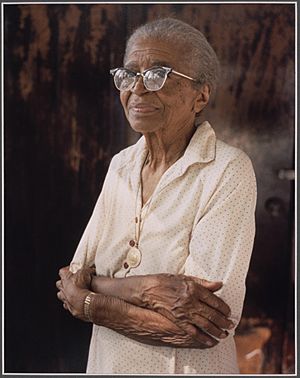Eunice Rivers Laurie facts for kids
Quick facts for kids
Eunice Verdell Rivers Laurie
|
|
|---|---|
 |
|
| Born | November 12, 1899 Georgia, U.S
|
| Died | August 28, 1986 (aged 86) |
| Nationality | American |
| Other names | Eunice Rivers |
| Occupation | Nurse |
| Known for | Medical study coordinator |
| Spouse(s) | Julius Laurie |
Eunice Verdell Rivers Laurie (1899 – 1986) was an African American nurse. She worked in the state of Alabama for many years. She is known for her important work in public health. She helped many people in rural communities.
Early Life and Learning
Eunice Verdell Rivers was born in 1899 in rural Georgia. She was the oldest of three daughters in a farming family. At that time, race relations in the U.S. were very difficult. Even though her family was poor, education was very important to them.
Her mother passed away when Eunice was 15 years old. But before that, she always told Eunice to "get a good education." This way, she wouldn't have to work so hard in the fields. Her father also believed in education. He wanted all his daughters to go to school. He worked long hours to help pay for their studies. He encouraged Eunice to become a nurse.
Eunice followed her father's advice. She went to the Tuskegee Institute School of Nursing. She graduated in 1922. The Tuskegee Institute was a very important school for Black students in Alabama. After graduating, Eunice Rivers worked in public health. She started in 1923 and continued even after she retired in 1965.
A Career Helping Others
In 1923, Eunice Rivers began working for the Tuskegee Institute Movable School. This school traveled around to different communities. It offered classes in farming, home economics, and health. Because she traveled so much, she became a trusted health expert. Many African-American farming families in rural Alabama relied on her advice.
She provided many health services to people. She taught about better sanitation and cleanliness. She also shared information about diseases like malaria and typhoid fever. She showed women how to make bandages from old clothes. She taught them how to care for sick family members. She also showed them how to take temperatures. For children, she gave talks on dental hygiene. She even handed out free toothpaste. Her work with men often focused on social hygiene.
Eunice Rivers was an employee of the Alabama Bureau of Child Welfare. Later, in 1926, she moved to the Bureau of Vital Statistics. Here, she helped improve how births and deaths were recorded. She also helped train midwives. She worked to lower the number of babies who died young. She created a system to track births and deaths in Alabama. She also continued to work with the Movable School. She traveled to help pregnant women and midwives. She was always part of the community. In her first year, she visited over 20 counties. She helped 1,100 people in one busy month.
Her work meant a lot of travel. She met with many African Americans in rural Alabama.
Making a Difference
Eunice Rivers lived and worked her whole adult life in Alabama. This was a time and place where race was a big issue. During the Jim Crow laws era, African Americans faced many challenges. They were expected to follow orders from white people. But Eunice Rivers showed great strength and courage.
She became one of the first African Americans to work for the United States Public Health System (PHS). This opened doors for other people of color. She started at the PHS during the Great Depression. This was a time when the U.S. economy was very bad.
Her life's work showed that African Americans could achieve great things. This was especially true in the South. She was known for her hard work and caring nature. Her excellent nursing skills earned her respect. Even her white supervisors praised her. They wrote many letters supporting her professional ability. They also noted her excellent people skills. As an African-American nurse, she played a key role in health care. She helped expand the impact of African Americans in medicine. Later, she received the Oveta Culp Hobby Award. This was the highest award for an employee in her department.
Later Life and Passing
In 1977, Eunice Rivers was interviewed for a special project. It was called the Black Women Oral History Project.
She passed away in 1986.

